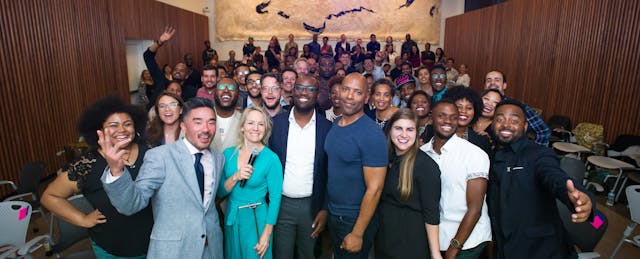At Camelback Ventures’ latest showcase, there were no hackneyed “hockey stick” graphs boasting viral adoption—as one often sees at startup pitchfests and demo days. Gone, too, were the scripted, anonymous testimonials touting the “awesomeness” of a product. In their place were beatboxing, a superhero cape and, yes, even some transparent financial numbers.
“Part of what I believe to be the truth,” Camelback’s founder and CEO, Aaron Walker tells EdSurge, “is that education is a long-tail game. This isn’t how many people downloaded your app. This is about students and families, and it takes time to cultivate these relationships.”
Hosted at the Kapor Center for Social Impact in Oakland, Calif., a dozen entrepreneurs from Camelback’s third fellowship shared ambitious social ventures to support literacy, speech therapy, incarcerated youth, Black male educators, restorative justice programs and media content that feature underrepresented groups in a positive light.
“This was an energetic cohort, laser-focused on equity, social justice and what it means to support students holistically,” Walker adds.
Launched in 2013, the program focuses specifically on supporting minority- and female-led ventures through a combination of coaching, networking and financial support in the form of a $40,000 investment. Nineteen of the 21 graduates from the previous cohorts are still around; combined they’ve raised more than $12 million in support from venture and foundation capital.
The fellowship is highly competitive; only 12 of the 181 teams (or 7 percent) were accepted for this latest class. Waker would like to be able to accept up to 18 total teams in the following years. Expanding that capacity is tied to funding, and he’s encouraged that more funders have stepped up. Camelback started with three partners in 2013: the Walton Family Foundation, NewSchools Venture Fund and Kapor Capital. Since then, AT&T, Bloomberg Philanthropies, the Schusterman Family Foundation and others have also chipped in.
“Our goal now is to figure out how to get those institutions to double down on their work with Camelback,” says Walker, instead of merely checking off a box on their efforts to support diversity in entrepreneurship.

Here are the 12 fellows from this year’s cohort:
Beat Rockers
James Kim, co-founder and executive director of BEAT (short for Bridging Education & Art Together), is on a mission to “take the ‘speech’ and the ‘therapy’ out of speech therapy,” he says. So what’s left? Sounds—specifically, percussive vocal sounds. It turns out, he says, that the “b,” “t” and “k” sounds are the building block for both beatboxing and speech.
His group is creating online lessons plans that uses beatboxing as tools for speech therapy, with a focus on helping blind and visually-impaired students. They’ve also done semi-private lessons for 5-7 year olds, and aim to release their first module of lesson plans by 2018.
Crete Academy
When Hattie Mitchell was in high school, she received a message from her college counselor that too many students today hear: she wasn’t college material. So she decided to do something for other students who are told they won’t make it. Mitchell founded Crete Academy, a nonprofit charter school in south Los Angeles for children grades preK through 6.
“Crete is an integrated school that provides students with basic needs,” says Mitchell. “A child’s wellbeing is as important as their academics.” The school offers each students, who often arrive to the school from local shelters or the streets, two physical and two dental exams, as well as on-site mental health counseling. Mitchell is raising $50,000 to keep Crete Academy from going in the red this fall.
The HadaNõu Collective
“Transforming misery into agency” is among the visionary goals that co-founder Wisdom Amouzou has for The HadaNõu Collective, which currently operates centers in public high schools that “map authentic experiences to academic standards.” The programs aims to spur students to engage and solve problems in local communities through exposure to technology, social activism and environmental sustainability efforts.
The school will serve 250 students across five centers this fall. Amouzou hopes to launch a full-time school in 2019 to serve 400 students.
H.O.L.L.A.
Short for “How Our Lives Link Altogether,” H.O.L.L.A. is Cory Greene’s effort to “support young people of color who have been impacted by institutionalized dehumanization.” A formerly incarcerated youth, Greene and his team run programs and social justice workshops that equip young people from historically oppressed communities with leadership skills based in relationship building, community organizing and political education.
“When you think about formerly incarcerated people, I challenge you to see us as full humans,” says Greene.
Literator
A local entrepreneur from East Oakland, Michelle Ching and her team are the brains behind Literator, a mobile app that allows teachers to capture and analyze data about students’ reading performance. The data can then be used by administrators to provide additional support for learners—or the teachers helping them. The app can also group students by their skill levels, and also integrates with attendance and demographic data to provide educators a more holistic look at their students. The startup claims usage in 1,100 schools across 48 states.
MindRight
“Untreated trauma is an invisible epidemic in inner-city neighborhoods,” says Ashley Edwards, founder of counseling text messaging platform MindRight. “We need to talk about crisis beyond the classroom.”
Edwards describes how inner-city youth in the U.S. often witness a murder by the time they graduate high school, yet there is on average only 1 school psychologist for every 2,000 students in the country. Her nonprofit offers a platform where students can get the counseling they need to manage traumatic stress through mental health coaching via their cell phones. The organization is currently partnering with five schools already, and has raised more than $300,000 to develop its platform.
P.S. 305
There’s a lot of learning going on at P.S. 305, but instead of instructing kids on arithmetic or spelling, the organization is teaching students and families about the education system they are a part of. The nonprofit is based in Miami, Fla., home to the country’s fourth largest school district, and where nearly 74 percent of students are low-income. Founder Yannell Selman aims to provide resources and training to keep parents informed about decisions happening on their campuses, along with information to prepare for testing season and a search tool where parents can see how their school is performing in the state.
Peer Connect
When Tyler Brewster explains why she co-founded Peer Connect, she thinks back to a conversation she had with a student while working as an educator in New York City. A student who had already been suspended multiple times said to her, “I’m used to being treated like a problem, so I act like one.”
It was that moment she says she realized something needed to change. Her venture, Peer Connect, is a nonprofit that provides restorative justice training for youth, community members and education stakeholders. Based in New York City, Peer Connect specifically focuses on youth and adults working in grades 9 through 12 to reduce the 18 million days of school that students miss per year due to non-violent suspensions. The organization provides workshops, curriculum and content on restorative justice and violence prevention to bring back to their communities and learning environments.
The Fellowship: Black Male Educators for Social Justice
Less than 2 percent of teachers in the U.S. are Black men, but Vincent Cobb wants to give that number a major boost through The Fellowship: Black Male Educators for Social Justice. The organization’s first major goal: to triple the number of Black male educators to 1,000 by 2025 in Philadelphia, where only 4 percent of teachers are Black men (yet nearly half of the student body is Black). Cobb says the group has already recruited more than 700 members, and has partnered with more than 20 organizations to develop those teachers and recruit even more.
TrainingGrounds
“We create opportunities for parents, caregivers and educators to learn the strategies and techniques necessary to create rich learning experiences,” shares Melanie Richardson, co-founder of TrainingGrounds. The nonprofit runs workshops that focus on teaching how children’s brains develop, and how that growth can be supported through the building of social-emotional skills. It also operates play centers that offer age-appropriate toys and activities, and help parents support and socialize with one another.
WeirdEnough Productions
Minority groups make up only 5.5 percent of productions positions, according to Tony Weaver, who’s started a nonprofit to combat that statistic along with media misrepresentation of people of color. His organization, WeirdEnough Productions, does this by providing media literacy seminars and offering curriculum for communities, school programs, colleges and professional development. In particular a program called Get Media Lit teaches “how to analyze media stereotypes and media literacy as a tool for social change,” says Weaver. The group also teaches youth how to make their own digital content and encourage the creation of more positive media images to offset negative stereotypes too often seen in entertainment, online and social media.
WordsLiive
Sage Salvo, founder of WordsLiive, says alarming statistics like how three-quarters of students in Washington D.C. can’t read on grade level, is a problem with a solution: “It boils down to being culturally responsive.” His company aims to improve literacy through “contemporary grammar integration,” an approach that evaluates contemporary languages—including music lyrics or social media texts—and connects that to classroom curriculum and literature including novels, speeches, essays or poems. For example, he shares that on the WordsLiive app, a teacher can choose a text they are teaching (like a Shakespeare play) and the platform will show a list of modern songs (like a John Legend hit) that integrate with the lesson plan.
Salvo cites companies like Flocabulary as a competitor, and his company is looking for $650,000 to grow its platform and increase its content library.


